
#SELFCARESUNDAYS: When self-love is something else you’re not that good at
Joanna Sing and Aditi Shivaramakrishnan
05 Nov 2017
On a day-to-day basis, my body really can’t change that much — I might have slightly greasier hair than normal, or my skin might be a bit clearer from one day to the next — but my attitude towards it does. Some days, I feel like my ego is leaking out my ears and sunshine is beaming out of my eyes, and I’ll bounce along the pavement imagining I’m in a music video. Other times, like last Thursday, I’ll cry because my bum looks weird in the mirror.
I absolutely go through periods of self-love and something that can be more like apathy, or even frustration, towards my body. These feelings aren’t even really restricted to how I look, rather my confidence in my ability to interact socially, do my job, and generally function in my daily existence.
“I’ve heard and read the self-care advice enough times”
When I do feel apathetic, or frustrated, I have an idea of what I should do. I’ve heard and read the self-care advice enough times. Exercise. Get out into a green space. Have a bath. Moisturise! The list goes on.
But my frustration only increases when I am doing all the self-care bits, meticulously ticking them off like a list, and I still feel rubbish. And then, when I obsess over my body and my confidence this much, on top of my stresses is guilt. It’s a guilt that asks me: why do you care about how you look so much? Is this not, at best, self-centred and shallow, and at worst, totally at odds with the values you preach as a feminist? How can you so wholeheartedly detest a society which judges women on their appearance then treats them accordingly, but digest and enact these ideas upon your own body?
The wave of feminism that my generation are now witnessing certainly has a focus on self-love and destroying the beauty standards which constrain us; while we might not love Theresa May, we want our politicians to be judged on their work, not on their looks; we want a diversity of appearances on our catwalks and on our television screens; we even got a feminist Barbie! We recognise the role that our appearances play in how we are treated in daily life, politically, and how this feeds into our own insecurities and mindsets.
“I’m sold on body positivity, but not wholly”
I’m sold on body positivity, but not wholly. I do hold issues with certain body-positive movements (i.e the ones that exclusively celebrate bodies that are historically conventionally attractive and would have been celebrated anyway — I wrote about #strongnotskinny here). It’s an easy world to tap into, if you’re a social media user. There are messages of “love yourself/your body” to be found in all the depths of the feminist internet. Yet, when I don’t love myself or my body, I don’t find these messages inspiring, so much as a reminder of something else I’m not that good at. The feelings of failure and guilt are, ironically, compounded by the fact I’m a thin woman with light skin and a healthy amount of privilege — this should not be a part of my feminist identity to grapple with.
The tension between my moral identity and ongoing insecurities is something I’ve only recently been able to pinpoint amongst a confusion of emotions. My coping strategies (self-care for when your self-care is failing, if you like), so far look like this:
1. (Attempting to) absolve myself of feminist guilt. I might reject society’s emphasis on and standards of the female body, but I still exist in this society. It’s going to be pretty hard to avoid all the negative messages out there which eventually worm their way into my psyche.
2. Not viewing self-care as another to-do list, and only doing the bits I enjoy. I’ve been trying to knit a scarf for two years now, but my desire for instant gratification really negates any calming effects of this craft. If I consider something I don’t like to be self-care, I just feel doubly pissed off when it doesn’t work.
Ultimately, it’s important for me to remind myself that I’ve been a woman longer than I’ve been a feminist, and have ingested and internalised patriarchal and Eurocentric beauty standards for longer than I’ve been able to critically engage with them. Furthermore, it’s fully okay for my relationship between these two identities to be a work in progress — feminism and body-positivity are, after all, meant to be a liberating rather than constraining force.








